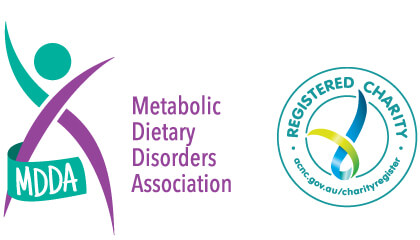Phenylketonuria (PKU) is a rare inherited disorder caused by a deficiency of the enzyme phenylalanine hydroxylase (PAH). This means people with PKU cannot properly break down phenylalanine (Phe) — an amino acid found in most foods — causing it to build up to toxic levels in the brain if left untreated.
How Common is PKU?
• Estimated 1,600 Australians live with PKU
• Affects roughly 1 in every 10,000 newborns in Australia
• Newborn screening (heel prick test) at 2–3 days of life allows early detection
Inheritance
• PKU is an autosomal recessive disorder — both parents must carry the gene.
• When both parents are carriers there is a 25% (or 1 in 4) chance with each pregnancy that their child will inherit the condition.
What is the Impact of PKU?
Without treatment, PKU can cause serious neurological damage, including:
• Developmental delays and severe brain damage
• Reduced attention and information processing abilities
• Challenges with executive and social cognitive functioning
• Increased risk of psychiatric disorders (around 50% higher)
Why is Diet So Important?
People with PKU must follow a strict, lifelong low‑protein diet supplemented by special Phe‑free amino acid supplements.
Typical daily protein intake:
• Adult male (without PKU): ~64g
• Adult female (without PKU): ~46g
• Person with PKU: 6–8g
• Pregnant/breastfeeding person with PKU: 1–3g
Maintaining low Phe levels is critical for child brain development and protecting a developing baby during pregnancy.
Available Treatments in Australia
•Strict low‑protein diet + special Phe‑free medical supplements
•Newborns must be fed special Phe‑free infant formula
•Low‑protein foods like special pasta, bread, cereal, cheese, and egg replacers
•A medication for some people with PKU to help control Phe levels
Economic & Social Impact
Managing PKU is challenging and costly, impacting many areas of life — from school and work to social connections.
PKU is a lifelong condition, but with early diagnosis, a dedicated low‑protein diet, and ongoing support, people with PKU can lead full, enriching lives.
Including Debra Colyer OAM PKU pioneer and the first infant diagnosed in Australia with PKU over 60 years ago.
